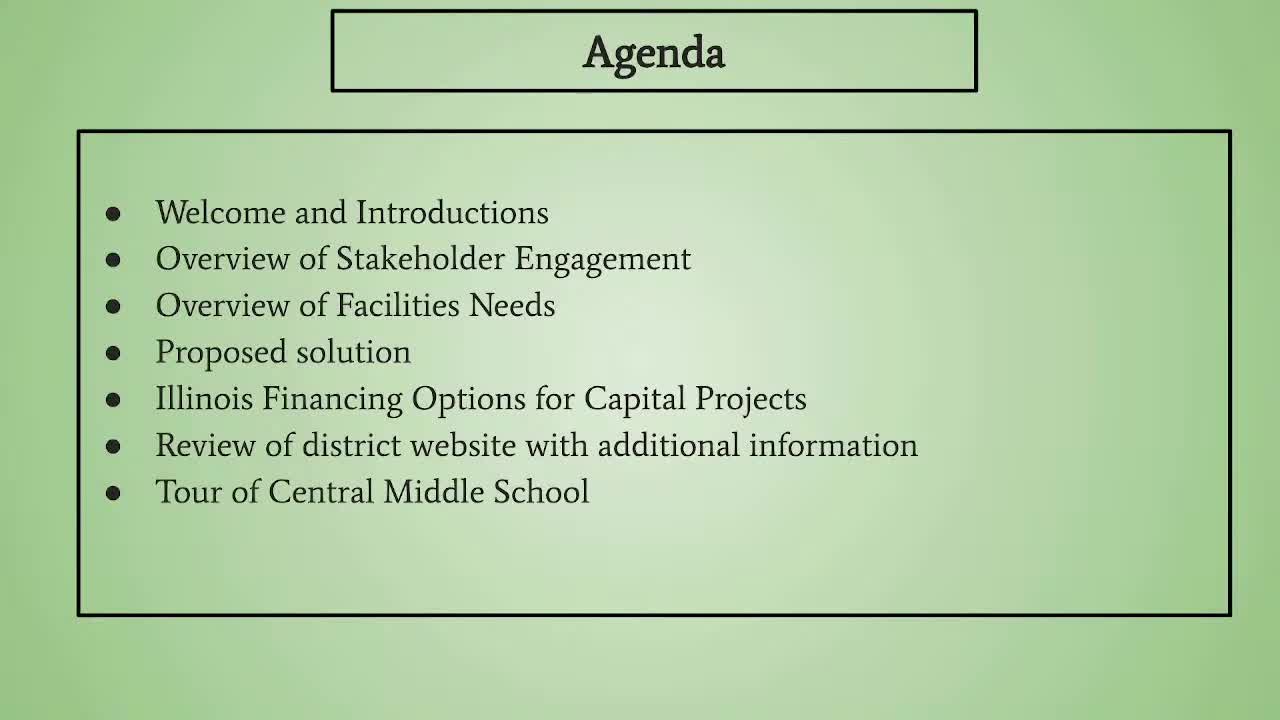Evergreen Park district outlines $109.8 million bond plan to replace aging middle school, remove mobile classrooms
Get AI-powered insights, summaries, and transcripts
Subscribe
Summary
Dr. Jenna Woodland, superintendent of Evergreen Park School District 124, told a public informational session the district plans to ask the community to consider a $109.8 million bond referendum to build a new Central Middle School and renovate elementary schools to remove aging mobile classrooms.
Dr. Jenna Woodland, superintendent of Evergreen Park School District 124, told a packed informational session that the district is proposing a bond referendum to address safety, accessibility and capacity problems at Central Middle School and to remove aging mobile classrooms at the district’s four elementary schools.
Woodland said the district’s citizens’ task force — after three years of engagement with staff, students, parents and community members — recommended testing a package that includes a new three‑story Central Middle School and renovations or additions at Northwest, Northeast, Southeast and Southwest elementary schools to eliminate mobile units and add dedicated spaces for STEAM, art and special education.
The proposal matters because, district leaders said, Central is nearly 100 years old and has multiple life‑safety, accessibility and infrastructure failures. "A new middle school facility wouldn't just solve these issues," Woodland said. "It would provide secure entry vestibules, optimized circulation, better visibility, accessible design, and infrastructure upgrades that create a learning environment where safety is fundamental." Jim Hennessy, the district’s director of facilities, told the meeting that many HVAC components and other mechanical parts at Central are so old that replacement parts are no longer available and continued repairs are only temporary fixes.
Architects from DLA Architects presented a conceptual design for a three‑story middle school facing 90th Street with an interior drop‑off lane, gym that doubles as an auditorium, a library, 36 classrooms, seven science labs and dedicated STEAM space. Peter, a lead architect with DLA, said the design would allow phased construction to keep current operations running while the new building is built on existing district property. "This design really works to accomplish that," he said, describing the site as well suited to wrap the new construction around the existing building during phased work.
At the elementary level, the citizens’ task force recommended removing 24‑year‑old mobile classrooms that the district, the regional office of education and staff say are past their useful life. Woodland recounted a break‑in to a mobile classroom as an example of security vulnerabilities and described multiple shared, undersized instructional spaces and stages being used for therapy or conferences because dedicated rooms do not exist.
On finances, Eric Grossi, the district’s director of finance, reviewed FY24 revenue and expenditures and said the district currently holds more than six months of reserves — above the board’s stated goal. Jen, a consultant from PMTA, presented financing assumptions for a $109,800,000 bond issue repaid over a 30‑year schedule (the maximum statutory term for school bonds). Using an assumed true interest cost of about 5.22%, the district showed an estimated total debt service of roughly $224.1 million and an average annual debt payment of about $7.7 million. Staff demonstrated an online calculator and provided an example showing an estimated monthly tax impact of $91.77 for a home with a $300,000 assessed value; staff emphasized individual impacts vary and encouraged homeowners to use the district’s calculator or their most recent tax documents for precise estimates.
Woodland and board member Rachel Merriquin emphasized that the referendum, if placed on the ballot, would be a community decision. Woodland said the board would consider placing a question on the March 17, 2026 primary ballot and reminded attendees that, under Illinois rules cited by staff, a referendum requires a majority (51%) of votes cast to pass. Community volunteer George Peso and Merriquin urged residents to tour the buildings and consider long‑term benefits to students, staff and property values if the district can modernize the facilities.
District staff laid out next steps for community engagement: the district has an online public opinion survey and a tax‑impact calculator, is scheduling building tours and will collect and publish FAQs on the district website. Woodland invited attendees to tour the mobile units after the session.
No final board action was recorded at the session; Woodland described the presentation as informational and framed the next step as a recommendation to the board to consider the referendum question for the March 2026 ballot.
